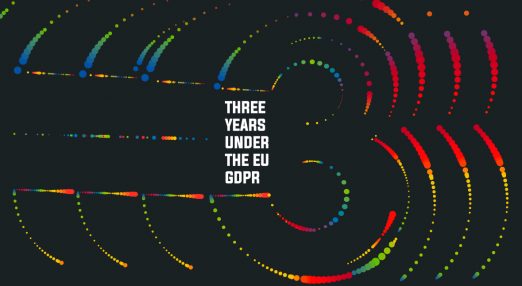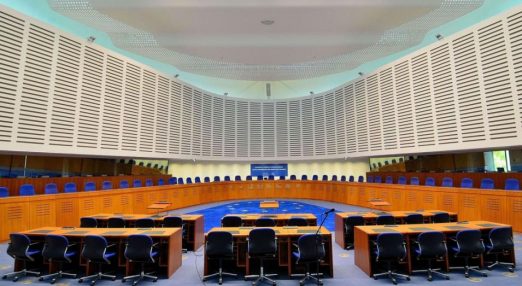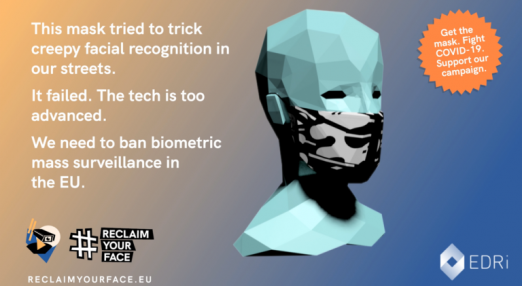Privacy and data protection
Privacy and data protection are essential for us to live, connect, work, create, organise and more. Governments and companies have long used mass surveillance for control trying to legitimise snooping for health, security or other reasons. The near-total digitisation of our lives has made it easier to control, profile and profit from our attention, data, bodies and behaviours in ways that are very difficult for us to understand and challenge. European data protection standards such as the GDPR are a good step forward but we need more to effectively ensure enforcement and protection against unlawful surveillance practices.
Filter resources
-

EDRi-gram, 2 June 2021
The GDPR is still in its infancy, and while it is too soon to consider revisions to the law, EU regulators and decision-makers have the power to improve enforcement and fulfil its promise for vindicating data protection rights and spurring the development of privacy-protecting business models. The past three years hold important lessons for decision-makers and regulators to leverage to deliver on that promise. A lot is at stake.
Read more
-

3rd Anniversary of the GDPR
Europe can pride itself to have passed the most progressive privacy legislation in the world, but small errors in the law and the lack of enforcement lead to legitimate frustration of users and small business. EDRi's member noyb reflects on the nature and impact of the GDPR.
Read more
-

European Court on Human Rights Bought Spy Agencies’ Spin on Mass Surveillance
For good or ill, and I believe for ill more than for good, with the present judgment the Strasbourg Court has just opened the gates for an electronic “Big Brother” in Europe. EDRi's member Electronic Frontier Foundation (EFF) discusses the recent European Court on Human Rights' decision that the British and Swedish surveillance regimes violate privacy.
Read more
-

UK: European Court decision in Big Brother Watch case does not go far enough to protect free expression and privacy
The finding of a violation is testimony to the doggedness of civil society in holding the UK government to account in the wake of the Snowden revelations about mass surveillance programmes. EDRI's member ARTICLE 19 welcomes the decision of the European Court of Human Rights (European Court) in Big Brother and others vs the UK, which ruled that the United Kingdom’s bulk interception of communications violated the right to privacy and failed to protect journalists in breach of the right to freedom of expression.
Read more
-

noyb aims to end “cookie banner terror” and issues more than 500 GDPR complaint
EDRi's member noyb.eu sent over 500 draft complaints to companies who use unlawful cookie banners - making it the largest wave of complaints since the GDPR came into force. "Some companies are clearly trying everything to make privacy a hassle for users, when they have a duty to make it as simple as possible."
Read more
-

Human rights groups win European Court of Human Rights claim on UK mass surveillance regime
Eight year legal battle against UK mass surveillance programmes exposed by whistleblower Edward Snowden culminates in victory for privacy. EDRi's member Privacy International worked actively to make this happen.
Read more
-

Antiterrorists in a bike shed – policy and politics of the Terrorist Content Regulation
The short story: an ill-fated law with dubious evidence base, targeting an important modern problem with poorly chosen measures, goes through an exhausting legislative process to be adopted without proper democratic scrutiny due to a procedural peculiarity. How did we manage to end up in this mess? And what does it tell us about the power of agenda setting the name of the “do something” doctrine?
Read more
-

EDRi-gram, 19 May 2021
The increasing use of facial recognition and other biometric surveillance technologies – on our streets, in train stations, at protests, at sports matches and even in our global ‘town square’, Facebook – means that our freedom to be anonymous in public spaces, our freedom to just be, really does face an existential threat. The mask is a symbol of resistance against the growing use of mass facial recognition. Get this symbolic merch and support the work EDRi does.
Read more
-

“E-evidence” negotiations: a call to protect media freedoms and democratic rights from abusive cross-border orders
Together with a coalition of 25 organisations and companies, European Digital Rights (EDRi) urges the European Parliament and the Council to uphold a high level of procedural safeguards in their negotiations on the so-called “e-evidence Regulation”.
Read more
-

Washed in blue: living lab Digital Perimeter in Amsterdam
An increasing amount of Dutch government agencies seem to resort to so-called ‘living labs’ and ‘field labs’ in order to test and experiment with technological innovations in a realistic setting. In recent years, these live laboratories have proven to be a useful stepping stone to introduce new technologies into public space. In the last several weeks, EDRi's member Bits of Freedom took a closer look at one of those living labs – the so-called Digital Perimeter surrounding the Johan Cruijff ArenA in Amsterdam – and were not pleased with what they saw.
Read more
-

FLoC: Google’s new means of following you across the web
If you browse the web without an ad blocker, you will have noticed that the ads you see tend to follow you around. Have you been looking around for a new pair of shoes? Be prepared to see more ads for shoes on completely unrelated websites. This advertising technique is called "behavioural retargeting" and is built on recording your web history in a central place, then using that information to select ads that advertisers expect you are more likely to react to. In this article. EDRi's member epicenter.works sheds some light on Google's new way of tracking users across the web.
Read more
-

New Cybercrime Protocol: weak safeguards against big risks of abuse
In 2017, the Council of Europe (CoE) and its Cybercrime Committee started preparing an additional protocol to the Budapest Convention on Cybercrime – a new tool for law enforcement authorities (LEAs) to have access to data held by private companies in the context of criminal investigations.
Read more
